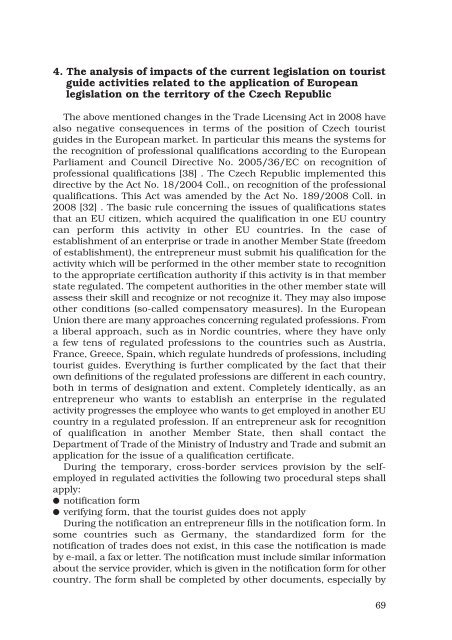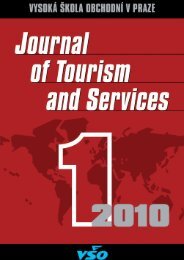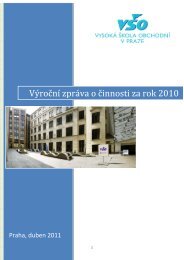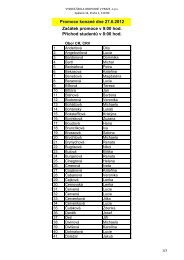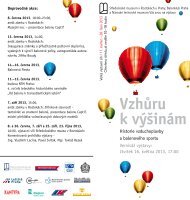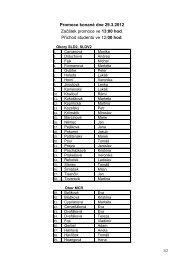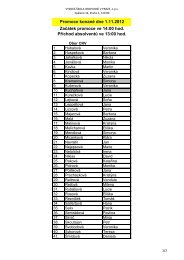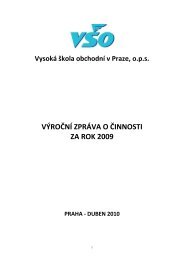Journal of Tourism and Services - Vysoká škola obchodnà v Praze
Journal of Tourism and Services - Vysoká škola obchodnà v Praze
Journal of Tourism and Services - Vysoká škola obchodnà v Praze
Create successful ePaper yourself
Turn your PDF publications into a flip-book with our unique Google optimized e-Paper software.
4. The analysis <strong>of</strong> impacts <strong>of</strong> the current legislation on tourist<br />
guide activities related to the application <strong>of</strong> European<br />
legislation on the territory <strong>of</strong> the Czech Republic<br />
The above mentioned changes in the Trade Licensing Act in 2008 have<br />
also negative consequences in terms <strong>of</strong> the position <strong>of</strong> Czech tourist<br />
guides in the European market. In particular this means the systems for<br />
the recognition <strong>of</strong> pr<strong>of</strong>essional qualifications according to the European<br />
Parliament <strong>and</strong> Council Directive No. 2005/36/EC on recognition <strong>of</strong><br />
pr<strong>of</strong>essional qualifications [38] . The Czech Republic implemented this<br />
directive by the Act No. 18/2004 Coll., on recognition <strong>of</strong> the pr<strong>of</strong>essional<br />
qualifications. This Act was amended by the Act No. 189/2008 Coll. in<br />
2008 [32] . The basic rule concerning the issues <strong>of</strong> qualifications states<br />
that an EU citizen, which acquired the qualification in one EU country<br />
can perform this activity in other EU countries. In the case <strong>of</strong><br />
establishment <strong>of</strong> an enterprise or trade in another Member State (freedom<br />
<strong>of</strong> establishment), the entrepreneur must submit his qualification for the<br />
activity which will be performed in the other member state to recognition<br />
to the appropriate certification authority if this activity is in that member<br />
state regulated. The competent authorities in the other member state will<br />
assess their skill <strong>and</strong> recognize or not recognize it. They may also impose<br />
other conditions (so-called compensatory measures). In the European<br />
Union there are many approaches concerning regulated pr<strong>of</strong>essions. From<br />
a liberal approach, such as in Nordic countries, where they have only<br />
a few tens <strong>of</strong> regulated pr<strong>of</strong>essions to the countries such as Austria,<br />
France, Greece, Spain, which regulate hundreds <strong>of</strong> pr<strong>of</strong>essions, including<br />
tourist guides. Everything is further complicated by the fact that their<br />
own definitions <strong>of</strong> the regulated pr<strong>of</strong>essions are different in each country,<br />
both in terms <strong>of</strong> designation <strong>and</strong> extent. Completely identically, as an<br />
entrepreneur who wants to establish an enterprise in the regulated<br />
activity progresses the employee who wants to get employed in another EU<br />
country in a regulated pr<strong>of</strong>ession. If an entrepreneur ask for recognition<br />
<strong>of</strong> qualification in another Member State, then shall contact the<br />
Department <strong>of</strong> Trade <strong>of</strong> the Ministry <strong>of</strong> Industry <strong>and</strong> Trade <strong>and</strong> submit an<br />
application for the issue <strong>of</strong> a qualification certificate.<br />
During the temporary, cross-border services provision by the selfemployed<br />
in regulated activities the following two procedural steps shall<br />
apply:<br />
● notification form<br />
● verifying form, that the tourist guides does not apply<br />
During the notification an entrepreneur fills in the notification form. In<br />
some countries such as Germany, the st<strong>and</strong>ardized form for the<br />
notification <strong>of</strong> trades does not exist, in this case the notification is made<br />
by e-mail, a fax or letter. The notification must include similar information<br />
about the service provider, which is given in the notification form for other<br />
country. The form shall be completed by other documents, especially by<br />
69


